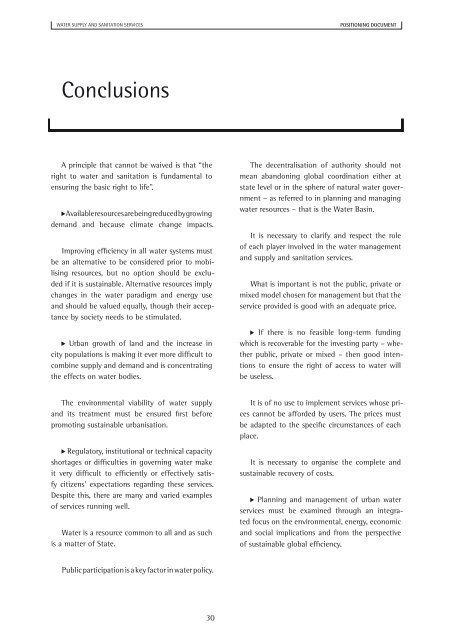Servicios de Abastecimiento y Saneamiento - La Tribuna del Agua
Servicios de Abastecimiento y Saneamiento - La Tribuna del Agua
Servicios de Abastecimiento y Saneamiento - La Tribuna del Agua
Create successful ePaper yourself
Turn your PDF publications into a flip-book with our unique Google optimized e-Paper software.
WATER SUPPLY AND SANITATION SERVICES<br />
Conclusions<br />
A principle that cannot be waived is that “the<br />
right to water and sanitation is fundamental to<br />
ensuring the basic right to life”.<br />
Available resources are being reduced by growing<br />
<strong>de</strong>mand and because climate change impacts.<br />
Improving efficiency in all water systems must<br />
be an alternative to be consi<strong>de</strong>red prior to mobilising<br />
resources, but no option should be exclu<strong>de</strong>d<br />
if it is sustainable. Alternative resources imply<br />
changes in the water paradigm and energy use<br />
and should be valued equally, though their acceptance<br />
by society needs to be stimulated.<br />
Urban growth of land and the increase in<br />
city populations is making it ever more difficult to<br />
combine supply and <strong>de</strong>mand and is concentrating<br />
the effects on water bodies.<br />
The environmental viability of water supply<br />
and its treatment must be ensured first before<br />
promoting sustainable urbanisation.<br />
Regulatory, institutional or technical capacity<br />
shortages or difficulties in governing water make<br />
it very difficult to efficiently or effectively satisfy<br />
citizens’ expectations regarding these services.<br />
Despite this, there are many and varied examples<br />
of services running well.<br />
Water is a resource common to all and as such<br />
is a matter of State.<br />
Public participation is a key factor in water policy.<br />
30<br />
POSITIONING DOCUMENT<br />
The <strong>de</strong>centralisation of authority should not<br />
mean abandoning global coordination either at<br />
state level or in the sphere of natural water government<br />
– as referred to in planning and managing<br />
water resources – that is the Water Basin.<br />
It is necessary to clarify and respect the role<br />
of each player involved in the water management<br />
and supply and sanitation services.<br />
What is important is not the public, private or<br />
mixed mo<strong>de</strong>l chosen for management but that the<br />
service provi<strong>de</strong>d is good with an a<strong>de</strong>quate price.<br />
If there is no feasible long-term funding<br />
which is recoverable for the investing party – whether<br />
public, private or mixed – then good intentions<br />
to ensure the right of access to water will<br />
be useless.<br />
It is of no use to implement services whose prices<br />
cannot be affor<strong>de</strong>d by users. The prices must<br />
be adapted to the specific circumstances of each<br />
place.<br />
It is necessary to organise the complete and<br />
sustainable recovery of costs.<br />
Planning and management of urban water<br />
services must be examined through an integrated<br />
focus on the environmental, energy, economic<br />
and social implications and from the perspective<br />
of sustainable global efficiency.


